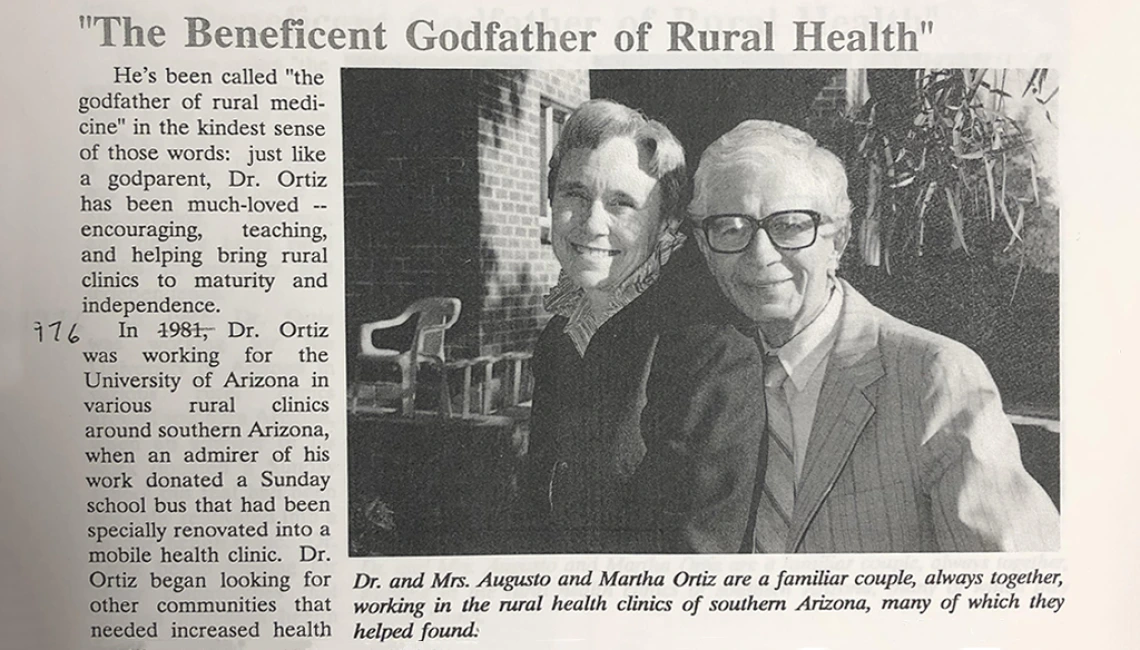Augusto Ortiz papers

Dr. Augusto and Martha Ortiz pictured in an article titled "The Beneficent Godfather of Rural Health", in the quarterly publication Our Health Clinics, published by United Community Health Center, Inc., 1991 (Box 18, Folder 8).
Collection dates: 1954-2007 bulk (bulk 1967-2000)
This collection contains Ortiz correspondence from 1969-2004 as well as documents relating to Citizens for Better Health, the Neighborhood Doctor’s Offices, the Maricopa County Community Health Network, the Comprehensive Health Planning Council of Maricopa County, Operation LEAP Leadership and Education for the Advancement of Phoenix), a Manpower Distribution Demonstration Project, a Community Health Worker Project, the Arizona Rural Health Federation, the Southern Arizona Rural Health Initiative, the United Community Health Center, the National Health Service Corps, Community Health Action on Wheels, the Community Health Aide Program, medical education and students, community oriented primary care, migrant laborer health, folk medicine and extensive documentation relating to the Mobile Health Program that Dr. Ortiz created. The collection also includes Dr. Ortiz’s U.S. Surgeon General Medallion. This collection is part of the Arizona Health Sciences Library (AHSL), a collection that focuses on the University of Arzona College of Medicine. It was transferred to Special Collections in 2018. Formerly collection number HT 0025.
Dr. Augusto “Gus” Ortiz was a family practitioner and educator, originally from Puerto Rico. Dr. Ortiz received his M.D. degree from the University of Illinois College of Medicine in 1949. As a doctor he first worked in Detroit and then in 1953 moved to Arizona to work at Luke Air Force Base in Glendale. In private practice in Phoenix for 17 years, he primarily served the needy Hispanic population there. He founded the inner city Neighborhood Doctors Office program, in collaboration with four major hospitals, to help solve inaccessibility problems of “notch group” patients – utilizing physician volunteers and with medical society approval. He also founded Citizens for Better Health and worked with various local organizations including the Maricopa County Community Health Network, the Comprehensive Health Planning Council of Maricopa County and Operation LEAP (Leadership and Education for the Advancement of Phoenix) to improve access to health care.
In 1972, Herbert Abrams MD recruited Dr. Ortiz to Tucson and the University of Arizona College of Medicine. Dr. Ortiz practiced in rural and urban clinics while teaching students from many health care disciplines. He established community health centers in various rural areas and initiated satellite clinics in El Río Health Center and West Pinal Family Health Center. He provided clinical services to areas where inaccessibility of care often leads to overutilization of emergency and hospital services. Working with volunteer and governmental agencies, he inspired health education programs for residents of underserved communities, pressed for legislation against pesticides and the short-handled hoe, and testified in favor of providing adequate sanitation for migrant farm workers. In collaboration with the University of Phoenix Center for Nursing Leadership, he initiated a program to train volunteers as health care assistants. A major thrust of his efforts was health promotion and disease prevention, including community education in self-care and in the political process to bring about changes in the system.
Dr. Ortiz’s three decades-long mobile health program effort provided health care to communities throughout southern Arizona as well as helping many of those communities establish permanent community health centers. Among the communities served by Dr. Ortiz and the mobile health program were Marana, Rillito, Casa Grande, Continental, Green Valley, Sahuarita, Arivaca, Three Points, Lakewood/Amado, Littletown, Helmet Peak, Tombstone and Catalina.
Other projects, initiatives and organizations relating to Dr. Ortiz’s work included a Manpower Distribution Demonstration Project, a Community Health Worker Project, the Arizona Rural Health Federation, the Southern Arizona Rural Health Initiative, the United Community Health Center, the National Health Service Corps, Community Health Action on Wheels and the Community Health Aide Program. Dr. Ortiz was also a medical educator and served as teacher, preceptor and mentor to students in many health care disciplines. Working in partnership with his wife, Martha, Dr. Ortiz dedicated his life to bringing health care to the poor and the underserved while also fighting for legislative changes what would protect health and make health care more widely available to the poor and underserved. Throughout his life Dr. Ortiz’s received various awards in recognition of his important work. On July 19, 2006 U.S. Surgeon General Dr. Richard Carmona awarded Dr. Ortiz the U.S. Surgeon General Medallion. Dr. Ortiz died December 16, 2006.
A collection guide explains what's in a collection. New to using our collections? Learn how to use a collection guide.
Collection guideAccess this collection
Visit us in person to access materials from this collection. Our materials are one-of-a-kind and require special care, so they can’t be checked out or taken home.
How to cite
Learn how to cite and use materials from Special Collections in your research.
